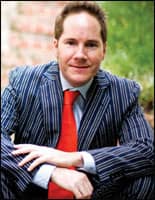by Christopher Pieler

Orthodontists are specialists, right? The homepage at braces.org certainly presents them to the public as such. “An orthodontist has 2 to 3 years of specialized training beyond dental school and is a specialist at straightening teeth and insuring proper form and function,” it says. So OP readers are not just specialists, they are specialized specialists.
And yet, from where I sit it seems like more and more orthodontists are expanding the scope of their professional activities. On this month’s cover, for example, we have Tyler H. Jolley, DMD, who is an orthodontist, periodontist, and novelist. He has some additional specialties, too, but you’ll have to read our feature article to find out what those are.
But Jolley is not the only one: I also know orthodontist prosthodontists and orthodontist/pedodontists, not to mention orthodontists who also give Botox injections, treat TMD, teach practice-management classes, invent new appliances, or design ties.
None of these multitaskers has decreased the time they spend on their orthodontic practice; it’s just that they have added new skills to their repertoire. The expedient explanation for this is that the economy is tight and even the diligent souls who invested in those extra 2 to 3 years of training are scrambling to find new ways to keep the money coming in. You could also theorize that with general dentists moving more teeth, the tooth-moving specialists have less work in their own realm of expertise and have to branch out into others. But I don’t think that’s the whole answer.
I think the type of person who chooses to become an orthodontic specialist has a built-in desire to fix things and help people, and this impulse can have many different outlets.
Join the conversation by answering .
For some reason, the comparison that leaps to my mind is the 19-century blacksmith. From the history I have read, I have an image of the blacksmiths of the pre-automobile era as pillars of the community who began with a devotion to the single skill of bending metal, but soon evolved into jacks of all trades who could build a gate, put shoes on a horse, set a broken bone—and pull a tooth if need be.
What do you besides move teeth? You can let me know by writing, calling, or answering the poll question on our Web site.
Christopher Piehler
/p>










